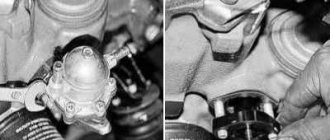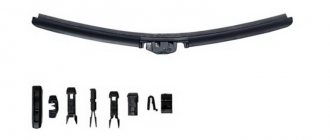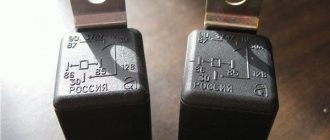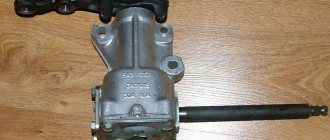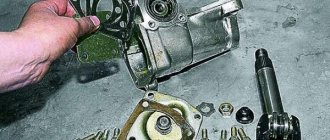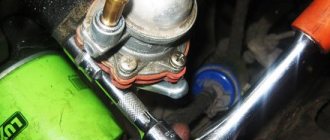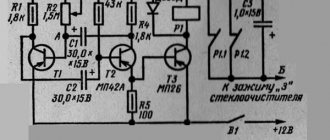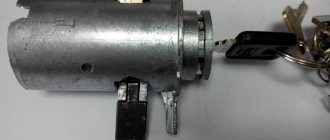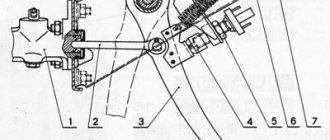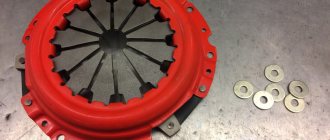Gasoline pump for carburetor VAZ 2107
One of the mechanisms of the power supply system of any engine is the fuel pump. The startup and operation of the power unit directly depends on its performance. Mechanical fuel pumps of the diaphragm type DAAZ 2101 were installed on carburetor “sevens”. Thanks to the simple design, the mechanism is repairable. However, it often causes problems for Zhiguli owners. Therefore, it is worth dwelling on the operation and malfunctions of this unit in more detail.
Main functions
The job of the fuel pump is to move fuel from the tank to the carburetor.
The power supply system of a VAZ 2107 with a carburetor engine consists of the following elements: 1 - fuel pump; 2 — hose from the fuel pump to the carburetor; 3 - carburetor; 4 — rear tube; 5 — sensor for level indicator and fuel reserve; 6 — safety shield; 7 — tank ventilation tube; 8 — fuel tank; 9 — gaskets; 10 — fuel tank mounting clamp; 11 — front tube; 12 — fine fuel filter
The design of the unit is not ideal, so it is one of the weak points in the car. This is explained by the fact that the impact of constant loads and low quality gasoline lead to natural wear and tear of the elements. This is what causes the device to fail. If a problem occurs with the pump, the engine begins to work intermittently or stops functioning altogether.
The fuel pump has a simple design, but is one of the weak points of the car
Design and operating principle
The mechanism is made of several parts connected to each other by fastening elements. There are two fittings in the upper part of the body through which fuel is supplied and pumped into the carburetor. The design includes a lever that allows you to manually pump gasoline from the tank into the fuel system, which is important after the car has been parked for a long time. The main elements of the node are:
- pusher;
- spring;
- balance;
- lid;
- cover screw;
- screw;
- mesh filter;
- membranes (working and safety);
- lower and upper plates;
- stock;
- valves (inlet and outlet);
- manual pumping lever.
Fuel pump design: 1 - discharge pipe; 2 - filter; 3 - body; 4 - suction pipe; 5 - cover; 6 - suction valve; 7 — rod; 8 — manual fuel pumping lever; 9 - spring; 10 - cam; 11 — balancer; 12 — mechanical fuel pumping lever; 13 — bottom cover; 14 — internal spacer; 15 — external spacer; 16 - discharge valve
The principle of operation of a classic fuel pump is based on creating the pressure necessary to maintain the required fuel level in the carburetor chamber. Thanks to the diaphragm, the flow of gasoline stops or decreases when a maximum pressure value is established in the fuel line. On carburetor “sevens” the fuel pump is located under the hood on the left side of the cylinder block. It is secured to two studs through a thermal spacer and gaskets, which are also used for adjustment. The spacer is also a guiding part for the pump rod.
The device operates in the following order:
- the pump pusher is driven by a drive cam operating from the gas distribution mechanism;
- the membranes located inside the gas pump move and alternately create pressure and vacuum in the chamber;
- if the pressure decreases, the outlet valve closes and fuel flows through the inlet valve;
- when the pressure increases, the valve at the pump inlet closes, and gasoline is supplied through a hose to the carburetor.
Under the action of the pusher, which is controlled by the gas distribution mechanism, a vacuum and pressure are alternately created in the fuel pump chamber, due to which the fuel suction strokes and its supply to the carburetor are ensured.
Which fuel pump is better
When there are problems with the fuel pump, the question of choosing a new device often arises. Owners of Zhiguli cars mainly prefer products of two. If problems arise with the factory mechanism, for example, when it overheats, many change it to the second option, explaining that Pekar pumps do not have a tendency to form a vapor lock, which causes defects in the operation of the device in hot weather. In fact, this opinion is wrong, since they also have this problem, as evidenced by numerous reviews from car owners. It is also worth considering that Pekar costs 1.5–2 more than DAAZ. Therefore, a standard fuel pump is the best choice based on criteria such as reliability, price and quality. The cost of a factory pump is 500–600 rubles.
The Pekar fuel pump, along with the DAAZ, is considered one of the best for classic Zhiguli cars.
Table: parameters of different fuel pumps
| Test results | "Baker" | DAAZ | QH | OTA |
| Zero supply pressure (at a crankshaft speed of 2 thousand rpm), kgf/cm² | 0,26 | 0,28 | 0,3 | 0,36 |
| Capacity for free drainage (at a crankshaft speed of 2 thousand rpm), l/h | 80 | 76 | 92 | 74 |
| Suction period at a crankshaft speed of 2 thousand rpm, s | 4 | 13 | 9 | 6 |
| Valve tightness at a pressure of 0.3 kgf/cm² (fuel leakage within 10 minutes), cm³ | 8 | 12 | 8 | 8 |
| Place | 3 | 4 | 1–2 | 1–2 |
QH petrol pumps are manufactured in the UK, while OTA petrol pumps are manufactured in Italy. However, these devices have some features: the QH pump does not have a lever for manual pumping of fuel, and the housing is non-separable. The Italian mechanism has excellent parameters compared to others, but its price is almost 3 times higher than Russian products.
What fuel pumps were equipped with classic VAZ models?
Classic VAZs include all models of the Zhiguli family, produced from 1970 to 2012 and their modifications:
- VAZ 2101;
- VAZ 2102;
- VAZ 2103;
- VAZ 2104;
- VAZ 2105;
- VAZ 2106;
- VAZ 2107.
Depending on the year of manufacture, the engines of these vehicles were equipped with different fuel systems. In all the first Zhiguli models, the fuel mixture was injected into the cylinders using a carburetor, and the fuel was supplied by a mechanical fuel pump. The latest modifications of the VAZ 2104, 2105 and 2107 had an injection system and an electric fuel pump.
Carburetor cars of the Zhiguli family were equipped from the factory with mechanical fuel pumps of the diaphragm type DAAZ 2101 (catalog number 1106010) produced by the Dimitrovgrad Automotive Unit Plant. Thanks to their simple design, reliability and maintainability, they have proven themselves well not only on the “classics”, but also on cars of the Sputnik and Samara families, which were equipped with their modified versions.
Carburetor VAZ 2101–2107 were equipped with DAAZ mechanical fuel pumps
Injection Zhiguli models were equipped with domestically produced electric fuel pumps. They were produced by the Pekar and Utes enterprises under catalog number 21073–1139009. The latest modifications of the Zhiguli were equipped with products (catalog number 2112–1139009). The same devices were installed on all models of the Samara and Lada families.
Injection models of classic VAZs were equipped with electric fuel pumps “Pekar”, “Utes”, “Bosch”
Fuel pump drive
The VAZ 2107 fuel pump operates from a pusher (rod) and an eccentric located on the shaft of auxiliary devices (“piglet”, intermediate shaft), which is driven by the timing mechanism through a gear. Auxiliary devices include distributor, oil and fuel pumps.
Operating principle
The drive works as follows:
- the intermediate shaft rotates via a timing chain;
- the eccentric acts on the rod and pushes it;
- the rod presses the fuel pump lever, ensuring its operation.
Fuel pump drive malfunctions
As the fuel supply unit wears out, problems may occur that affect the performance of the latter.
Rod wear
The main sign of a worn-out rod is that the car does not reach the required speed. If the car accelerates, but, having gained speed to a certain value, does not develop it anymore, the reason is precisely the wear of the rod. Recently, the pusher has been made from such low-quality metal that it leads to wear out literally after 500–1000 km. The edge of the rod on the eccentric side is simply flattened, which indicates the need to replace the part.
Rod wear directly affects the performance of the fuel pump
The fuel pump rod should be 82.5 mm long.
Diagnostics and replacement of the electric fuel pump on cars of the Zhiguli family
In injection engines of classic VAZs, the fuel pump may lose its functionality both due to problems with the power supply to it and due to a malfunction of its electric motor. In the first case, the situation can be corrected by diagnosing and repairing the electrical circuit of the device. But if the electric motor of the pump fails, only replacing it will help.
Checking the protection devices for the electrical circuit of the fuel pump on injection VAZs of the Zhiguli family
If there is a problem with the electrical equipment of the fuel pump circuit, it usually does not turn on at all. Turn on the car's ignition without starting the engine and listen. First, you should hear a click from the relay, and then a characteristic “squeal” emitted by the pump’s electric motor. If you don’t hear anything like this, start diagnosing with the electrical circuit of the device.
The pump circuit is connected to the on-board network via a separate relay, and its protection is provided by a fuse. Both of these devices are located in the vehicle's optional mounting block. You will find it under the glove box. It contains 3 relays and 3 fuses. The fuel pump relay (indicated R2 in the diagram) is located in the middle, and the fuse (F3) is to the left of it. We pull the fuse out of its seat and check it by “ringing” it with a tester. If a malfunction is detected, we replace it, not forgetting to comply with the rating (15 A).
You can check the functionality of the relay by installing a known working device in its place. Instead, replace it with the relay located to the right of the one being diagnosed, which is responsible for the radiator fan circuit. If this option does not suit you, turn on the ignition and measure the voltage between the pink wire going to the relay and the vehicle ground. The device should show 12 V. This means that the device is powered. After this, you need to connect the pink wire with the gray one at the relay terminals. So we will connect the fuel pump directly to the battery. If it works (that same “squealing” sound will be heard), simply replace the relay.
The fuel pump relay is located in the middle (R2), and the fuse is located to the left of it (F3)
Checking the fuel pressure in the system
The main indicator of the operation of a fuel pump is the pressure it creates in the system. If the device turns on, pumps fuel, but the engine runs intermittently, take the time to check the pressure. To do this, you will need a pressure gauge with a measuring range of 5–7, equipped with a gas-resistant hose and a threaded fitting (if there is no special one, you can use a regular tire pressure gauge). The sequence of actions is as follows:
- On the fuel rail we find a fitting closed with a plastic cap. Unscrew the cap and connect the pressure gauge hose to the fitting. If your device is not equipped with a special threaded fitting, the hose can be secured to the “nipple” using a small clamp.
Pressure connection - We start the engine and look at the instrument readings at idle. The pressure in the system should be between 2.8–3.2 atmospheres. Otherwise, the fuel pump is faulty.
The pressure in the ramp should be 2.8–3.2 atmospheres - Just in case, let's check the pressure regulator (also located on the ramp).
Without disconnecting the pressure gauge, disconnect the vacuum hose from it. The pressure should rise by 0.2–0.7 atmospheres. The pressure has not increased - we are replacing the pressure regulator. When removing the vacuum hose from the regulator, the pressure should drop by 0.2–0.7 atmospheres
Diagnostics
A malfunction of the VAZ 2114/2115 fuel pump can be caused by:
- malfunctions in the device’s power supply circuit;
- failure of starting and protection elements (relay and fuse);
- wear of electric motor parts.
Checking the electrical circuit
At the beginning of the diagnosis, you should check the electrical circuit of the fuel pump. To do this you will need:
- car tester (multimeter);
- crosshead screwdriver;
- two pieces of wire about 2 m long.
The cost of this repair at a car service
The fuel pump on a VAZ 2114 (injector, 8 valves) is easy to change. Many car owners do not want to spend their personal time on such work. The car is sent to a car service center, where experienced technicians will perform the replacement themselves. The average cost of the service in Russia ranges from 800 to 1500 rubles. When replacing the fuel module yourself, you need to show maximum attention and be consistent. To extend the life of your vehicle's fuel system, do not forget to refuel with high-quality fuel and carry out maintenance on time.
Source
Let's sum it up
Taking into account the above information, it becomes clear that the uninterrupted operation of the electric fuel pump of the VAZ 2110 or any other car will depend on correct and timely preventive maintenance, as well as on careful operation and compliance with certain rules.
We also recommend reading the article on how to change the fuel pump mesh with your own hands. From this article you will learn when and why it is needed, as well as how to replace the fuel pump strainer.
Only clean fuel should be poured into the tank and the fuel filter should be changed promptly. It may also be necessary to periodically change or clean the fuel pump strainer, use a moisture displacer from the gas tank, etc. Please note that it is not recommended to drive with an empty tank as the pump will not cool properly.
Finally, we note that in the event of malfunctions in the operation of the internal combustion engine, it is quite possible to diagnose and replace the fuel pump yourself in a regular garage (if you have the tools). However, working with the fuel system will require increased caution and compliance with all safety measures. If you are not confident in your abilities, it is better to turn to experienced specialists.
Symptoms of a problem
A malfunction of the fuel pump of VAZ 2114/2115 cars can be diagnosed by the following symptoms:
- when the ignition is turned on, there is no sound of the pump running;
- the engine does not start or starts with difficulty;
- the power unit is unstable at idle, the speed “floats”;
- “dips” appeared during acceleration;
- the motor has lost power.
The same signs also appear when other elements of the fuel system malfunction.
Before you begin diagnosing or replacing the fuel pump, you should make sure that:
- the fine fuel filter is not clogged (it is changed every 7 thousand kilometers);
- the injectors and fuel pressure regulator are operating normally;
- The sensors for mass air flow, throttle position, and oxygen quantity are working properly.
If the detected malfunction is accompanied by the lighting of the “CHECK” lamp on the dashboard, you should set the error code and decipher it.
